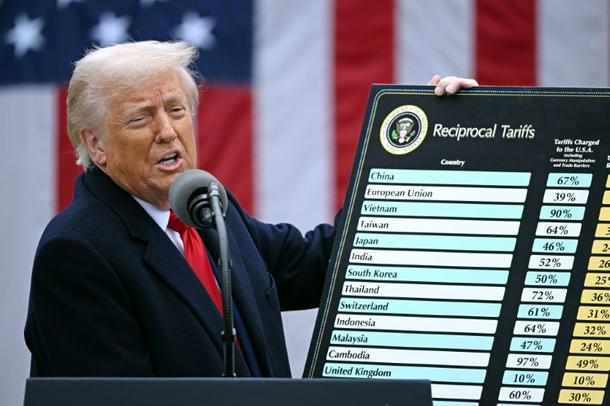
Trump's administration has argued that judges do not have the authority to block his tariffs regime
Washington (AFP) - The White House on Thursday blasted a federal court’s decision to block many of President Donald Trump’s sweeping tariffs, marking a major setback to his trade strategy.
Since returning to the presidency in January, Trump has moved to redraw US trade ties with the world while using tariffs as a negotiating tactic to pressure foreign governments to the table.
But the stop-start rollout of levies, impacting both friend and foe, has roiled markets and snarled supply chains.
The three-judge Court of International Trade ruled Wednesday that Trump had overstepped his authority, and barred most of the duties announced since he took office.
The White House called the ruling “blatantly wrong,” expressing confidence that the decision would be overturned on appeal.
White House spokeswoman Karoline Leavitt told reporters that the judges “brazenly abused their judicial power to usurp the authority of President Trump.”
Attorneys for the Trump administration have filed an appeal against the ruling, which gave the White House 10 days to complete the process of halting affected tariffs.
In a court filing, the Justice Department urged for an immediate administrative halt on the decision, saying the administration plans to seek emergency relief from the Supreme Court as soon as Friday.
- ‘Nothing’s really changed’? -
Trump’s trade advisor Peter Navarro told Bloomberg Television: “Nothing’s really changed.”
Kevin Hassett, director of the National Economic Council, told Fox Business that although officials have other options that would “take a couple of months” to implement, they are not planning to pursue these right now.
He insisted that “hiccups” because of decisions by “activist judges” would not affect negotiations with other trading partners, adding that three deals are close to finalization.
Trump’s global trade war has knocked markets with import levies aimed at punishing economies that sell more to the United States than they buy.
He argued that resulting trade deficits and the threat posed by drug smuggling constituted a “national emergency” that justified the widespread tariffs – which the court ruled against.
- China: ‘cancel wrongful tariffs’ -
Trump has been using tariffs as leverage in trade negotiations, including with the European Union and China.
Beijing – which was hit by additional 145 percent tariffs before they were temporarily reduced to give space for negotiations – reacted by saying Washington should scrap the levies.
“China urges the United States to heed the rational voices from the international community and domestic stakeholders and fully cancel the wrongful unilateral tariff measures,” said commerce ministry spokeswoman He Yongqian.
Canadian Prime Minister Mark Carney said his government welcomed the court decision, but warned that trade ties were still “profoundly and adversely threatened” by the remaining sector-specific levies and further threats.
Trump unveiled sweeping import duties on nearly all trading partners in April, at a baseline 10 percent – plus steeper levies on dozens of economies including China and the EU, which have since been paused.
The US court’s ruling also quashes duties that Trump imposed on Canada, Mexico and China separately using emergency powers.
But it leaves intact 25 percent duties on imported autos, steel and aluminum.
Asian markets rallied Thursday but US indexes were mixed around midday. Europe closed slightly down as realization sank in that the decision might not be a definitive moment.
- ‘Extraordinary threat’ -
The federal trade court was ruling in two separate cases – brought by businesses and a coalition of state governments – arguing that the president had violated Congress’s power of the purse.
The judges said the cases rested on whether the International Emergency Economic Powers Act of 1977 (IEEPA) delegates such powers to the president “in the form of authority to impose unlimited tariffs on goods from nearly every country in the world.”
The judges stated that any interpretation of the IEEPA that “delegates unlimited tariff authority is unconstitutional.”
Analysts at London-based research group Capital Economics said the case may end up with the Supreme Court, but would be unlikely to mark the end of the tariff war.
Trump could explore other sections of US law or seek congressional approval for tariffs.
burs-bys/bgs